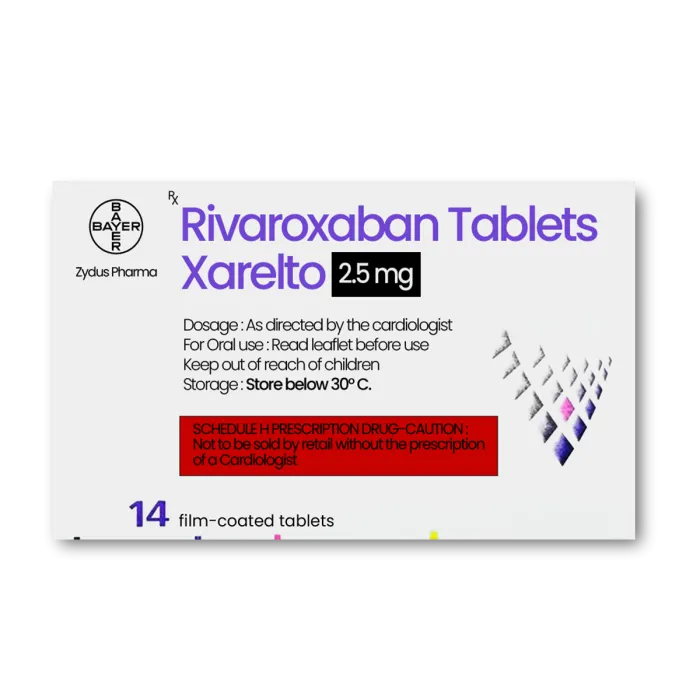
Xarelto 2.5mg Tablet
| Pack Size | Price | Qty | Unit Price |
|---|---|---|---|
| 28 Tablet/s | $40.43 | $1.44 | |
| 56 Tablet/s | $76.81 | $1.37 | |
| 84 Tablet/s | $109.15 | $1.30 |
What is Xarelto 2.5 mg
Xarelto 2.5 mg offers effective anticoagulation therapy for various cardiovascular conditions. Each tablet contains FDA-approved Rivaroxaban (2.5 mg), a direct Factor Xa inhibitor. This medication belongs to the Novel Oral Anticoagulant (NOAC) class of blood thinners.
Bayer Zydus Pharma Pvt Ltd produces this anticoagulant medication. Rivaroxaban works by selectively blocking Factor Xa, a crucial enzyme in the blood clotting cascade. This action prevents harmful blood clot formation while maintaining necessary hemostatic function.
The medication treats blood clots in individuals with Atrial Fibrillation (irregular, rapid heart rate). It also prevents Venous Thromboembolism (blood clot in a vein), especially after hip or knee replacement surgeries. It reduces the risk of Pulmonary Embolism (PE) and clot recurrence in patients with prior events.
The Xarelto 2.5 mg dose provides targeted anticoagulation without requiring routine blood monitoring. This convenience improves patient compliance compared to traditional anticoagulants.
Common Xarelto side effects include bleeding complications, bruising, and gastrointestinal disturbances. Patients should avoid activities that have a high injury risk.
Regular medical supervision ensures safe and effective treatment outcomes. Any unusual bleeding episodes require immediate medical attention.
What are the benefits of Xarelto 2.5 mg
Xarelto 2.5 mg provides superior anticoagulation through selective Factor Xa inhibition. This mechanism prevents fibrin formation and subsequent blood clot development. The medication offers predictable anticoagulant effects without frequent monitoring requirements.
Key therapeutic applications include:
- Clot prevention in non-valvular Atrial Fibrillation patients.
- Venous Thromboembolism treatment and prevention.
- Reducing cardiovascular death risk in certain patient populations.
- Reduced clot formation in the lungs, brain, and other body parts
Clinical studies demonstrate a significant reduction in systemic embolism rates. The medication provides consistent anticoagulation with rapid onset and offset of action. Patients experience improved quality of life without dietary restrictions or frequent laboratory monitoring.
Xarelto tablet indications include post-acute coronary syndrome management in combination with Aspirin in selected patients. It offers convenient once or twice-daily dosing for most indications, improving medication adherence and treatment outcomes.
How to take Xarelto 2.5 mg
Xarelto 2.5 mg is a prescription anticoagulant requiring careful medical supervision. Follow your doctor's instructions precisely for optimal safety and effectiveness. Here are the general guidelines:
- Take Xarelto 2.5 mg once/twice daily as prescribed, at the same time.
- Swallow the tablet whole with water. Do not crush or break the tablet before swallowing.
- Take it with or without food.
- Do not exceed the prescribed Xarelto dosage or duration without medical consultation.
Strengths and substitutes
The strengths and substitutes available at Cheap Medicine Shop are:
| Xarelto 10 Mg Tablet | $90.00/10 tablets |
| Xarelto 20 Mg Tablet | 25.90/10 tablets |
What are the side effects of Xarelto 2.5 mg
Xarelto 2.5 mg side effects primarily relate to its anticoagulant properties. However, it may cause various adverse reactions, including:
- Bleeding complications
- Bruising
- Skin discoloration
- Gastrointestinal disturbances
- Headache
- Dizziness
Most of these adverse effects resolve quickly. However, you require immediate medical attention if they are severe or persistent, particularly any unusual bleeding episodes.
Safety Advice
Patients with mild liver impairment may use Xarelto with caution. Moderate to severe liver disease significantly increases bleeding risk, and the medicine may be unsafe in severe cases. Regular liver function monitoring ensures safe medication use in affected patients.
Kidney function directly affects Rivaroxaban elimination and bleeding risk. Patients with reduced kidney function require dose adjustments or alternative treatments. Severe kidney impairment may contraindicate Xarelto use entirely.
Xarelto is not recommended during pregnancy due to bleeding risks. The medication may cause fetal harm and pregnancy complications. Breastfeeding mothers should avoid this medication as it passes into breast milk.
Avoid other anticoagulants, antiplatelet medications, and NSAIDs unless specifically prescribed. Limit alcohol to reduce bleeding risk. Avoid activities with high trauma potential, like contact sports.
FAQs
How quickly does Xarelto 2.5 mg start working?
Xarelto begins anticoagulation within 2-4 hours of administration. Peak anticoagulant effects occur within 2-4 hours after taking the tablet. Consistent daily dosing maintains steady therapeutic anticoagulation levels throughout the treatment duration effectively.
What foods should I avoid while taking Xarelto 2.5 mg?
Unlike traditional blood thinners like Warfarin, Xarelto has minimal dietary restrictions requiring patient attention. However, patients should limit alcohol consumption significantly and avoid consuming large quantities of cranberry products during treatment.
Can I have dental procedures while on Xarelto 2.5 mg?
Dental procedures require special bleeding precautions due to anticoagulation effects from Rivaroxaban medication. Always inform your dentist about your current Xarelto use before any dental treatment procedures. Minor dental work may continue with appropriate bleeding precautions implemented.
What happens if I miss a dose of Xarelto 2.5 mg?
Take the missed Xarelto dose as soon as you remember. If you remember when it's close to the time of the next one, skip the missed dose completely and continue your regular dosing schedule. Never take double doses to compensate.
How long will I need to take Xarelto 2.5 mg?
Treatment duration varies significantly depending on your specific medical condition and individual bleeding versus clotting risk factors. Some patients require lifelong anticoagulation therapy, while others need shorter treatment courses. Your cardiologist will determine the most appropriate treatment duration.
{{title}}
{{{detail}}}
{{#adminComment}}